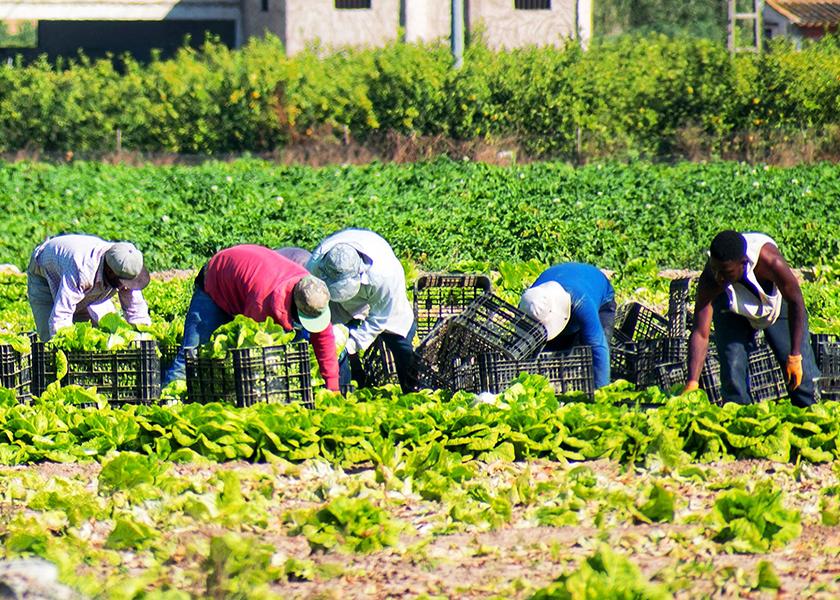New rule aims to give H-2A workers new protections

H-2A workers would receive new protections under a proposal from the Department of Labor.
The proposed new rule would strengthen protections for farmworkers in the H-2A program and help prevent abuses that undermine wages and standards for all agricultural workers, according to the agency.
“Farm workers are vital to our farmers, our food supply and our communities,” acting Labor Secretary Julie Su said in a news release. “This proposed rule would strengthen protections for H-2A farm workers who are particularly vulnerable to labor abuses, empower them to advocate for fair treatment and ensure that their employment does not depress labor standards and undercut domestic farm workers. The administration is committed to protecting all workers, and this proposal would significantly advance that effort.”
This proposal builds on a final rule the department published in October 2022 that modernized key aspects of the H-2A program. If implemented, this new rule would improve workers’ ability to advocate for better working conditions by expanding and clarifying existing anti-retaliation protections, according to the release.
The proposed rule would also expand workers’ rights to invite and accept guests — including labor organizations — to employer-provided housing. Additionally, for workers not protected by the National Labor Relations Act, the proposed rule would require employers to provide a list of workers to a requesting labor organization, permit workers to designate a representative to attend any meeting between a worker and the employer where the worker reasonably believes that the meeting may lead to discipline, and prohibit employers from holding captive audience meetings unless the employer provides certain information to ensure that such meetings are not coercive, the release said.
The proposal would also create greater transparency for workers about their prospective employers’ stance on their right to organize freely and without interference by requiring employers seeking to hire H-2A workers to provide a certification to the Department of Labor that the employer will bargain in good faith over the terms of a proposed labor neutrality agreement with a requesting labor organization or will explain why they will not do so, according to the release.
The proposed rule would clarify that an employer only terminates a worker for cause when the worker either fails to meet pre-specified productivity standards or fails to comply with employer policies after the employer applies a system of progressive discipline, the release said. The proposal would establish six conditions to terminate a worker for cause, including that the employee has been informed of, or reasonably should have known, the employer’s policy, rule or productivity standards.
Clarifying the meaning of the term for cause in existing regulations is important because termination for cause generally strips affected workers of their right to be offered work hours of at least three-quarters of the contract period and the right to outbound transportation, according to the release. For U.S. workers, termination for cause also strips them of their right to be contacted for employment in the subsequent year, the release said.
The proposal would also make foreign labor recruitment more transparent, the release said. In line with concerns expressed by workers’ rights and anti-trafficking organizations, the Government Accountability Office and the department’s Office of Inspector General, the department has found that increased transparency is necessary to help protect agricultural workers from predatory practices during the recruitment process, the release said.
The proposed rule would require employers to provide a copy of all agreements with any agent or recruiter the employer engages in recruiting prospective H-2A workers to the department, regardless of whether the agent is in the U.S. or abroad. The proposed rule would also require employers to identify and disclose the name and location of anyone soliciting H-2A workers on their behalf, the release said.
The proposed rule would make wages more predictable in the H-2A program by making new wage rates applicable immediately upon their publication in the Federal Register rather than weeks later, the release said. “This will ensure that agriculture workers are paid the most up-to-date wages as soon as possible,” the Labor Department said in the release.
The rule would also require employers who fail to provide adequate notice to workers of a delay in their start date to pay workers the applicable rate for each day that work is delayed for up to 14 days, the release said. The proposal would further require enhanced transparency for employers to communicate minimum productivity standards, applicable wage rates, overtime opportunities and delayed start dates to workers.
The proposal also seeks to improve workers’ access to safe transportation, including seat belts. Workers in the H-2A program often travel long distances to and from the worksite in crowded vans and buses, sometimes driven by workers who worked all day, raising grave concerns about transportation safety. The proposed rule would add a seat belt requirement to reduce these hazards. For vehicles that are required by the Department of Transportation to be manufactured with seat belts, the proposed rule would prohibit the use of any employer-provided vehicle to transport H-2A workers unless each occupant is wearing a seat belt before the vehicle is operated, except in specific circumstances, the release said.
Another goal of the proposal, the agency said, is enhancing enforcement to improve program integrity. The proposed rule would increase the speed with which the debarment of any business that violates H-2A program rules becomes effective by streamlining deadlines for Office of Foreign Labor Certification integrity and Wage and Hour Division enforcement actions. The proposed rule would also make it easier for the workforce system to discontinue necessary recruitment services for employers who have failed to meet program requirements, the release said.
Finally, the proposed rule would prohibit employers from holding or confiscating a worker’s passport, visa or other immigration or government identification documents.
Upon publication in the Federal Register, the notice of proposed rulemaking will be open for public comment for 60 days. The department said it will consider all comments received before publishing a final rule.







